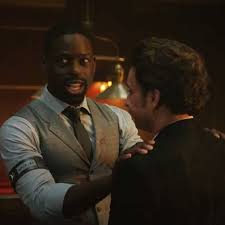SHORT TAKE:
Lovely, delightful and moving documentary covering the life of both Fred Rogers and his Neighborhood.
WHO SHOULD SEE IT:
Absolutely everyone. No really – unequivocally, no holds barred, universally, unabashedly, and without even the smallest reservation – EVERYONE!!!!
AND IF YOU LIKE THESE REVIEWS PLEASE SUBSCRIBE! THEN YOU'LL GET EVERY NEW REVIEW SENT STRAIGHT TO YOUR E-MAIL!!
GO TO THE BOTTOM OF THE LEFT HAND SIDE AND TYPE YOUR E-MAIL IN – IT (SHOULD BE) THAT EASY. ANY PROBLEMS PLEASE SEND ME A COMMENT AND I'LL DO MY BEST TO RESOLVE YOUR ISSUE.
LONG TAKE:
When I was a kid, I had a brother and sister who were 9 and 10 years older, respectively, than I. Come to think of it, they STILL are 9 and 10 years older. Also, my Dad and I were buddies. I’d go to the hardware store with him, and I would hang around and “help” him with construction projects around our house. He was 40 when I was born. My point is that when we turned on the TV it was 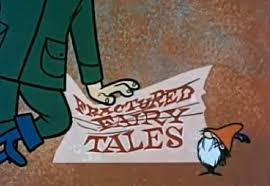 “Fractured Fairy Tales” on Rocky and Bullwinkle,
“Fractured Fairy Tales” on Rocky and Bullwinkle, 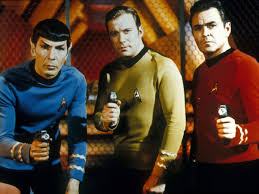 Star Trek, Hogan’s Heroes,
Star Trek, Hogan’s Heroes, 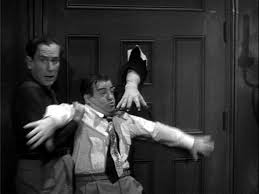 Abbot and Costello, The Great Escape, Wagon Train and
Abbot and Costello, The Great Escape, Wagon Train and 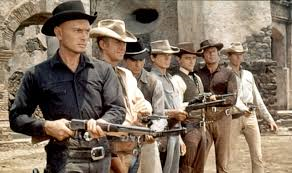 The Magnificent Seven.
The Magnificent Seven. 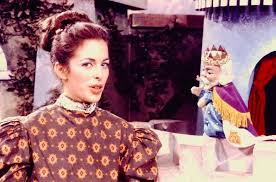 The quiet and gentle wisdom of Mr. Roger’s Neighborhood and his cardigan sweaters
The quiet and gentle wisdom of Mr. Roger’s Neighborhood and his cardigan sweaters  was just not on my radar. So later, when I had kids, while I respected the show, and thought he was doing something nice for kids, I just wasn’t that interested.
was just not on my radar. So later, when I had kids, while I respected the show, and thought he was doing something nice for kids, I just wasn’t that interested.
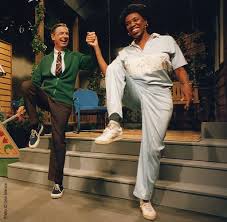 So I was surprised by my own emotional reaction to Won’t You Be My Neighbor.
So I was surprised by my own emotional reaction to Won’t You Be My Neighbor.  I realized then that Fred Rogers had seeped, ever so slowly, into my consciousness with his gentle, joyful manner over the last 50 years.
I realized then that Fred Rogers had seeped, ever so slowly, into my consciousness with his gentle, joyful manner over the last 50 years. 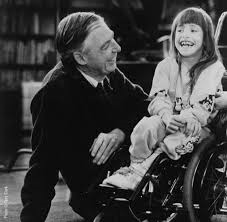 He was simply a kind and decent man who both advocated as a motto of his show and lived by the personal ethic: “I like you just the way you are.” Fred Rogers spent his life wisely, as the personification of Jesus' answer to the question which preambled the parable of The Good Samaritan: "Who is my neighbor?"
He was simply a kind and decent man who both advocated as a motto of his show and lived by the personal ethic: “I like you just the way you are.” Fred Rogers spent his life wisely, as the personification of Jesus' answer to the question which preambled the parable of The Good Samaritan: "Who is my neighbor?"  There is no doubt in my mind that the name of his show was intended as an incarnation of that answer – that, to Mr. Rogers, everyone was his neighbor.
There is no doubt in my mind that the name of his show was intended as an incarnation of that answer – that, to Mr. Rogers, everyone was his neighbor. 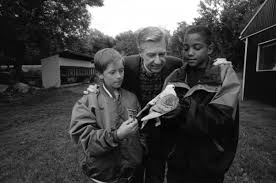 And Fred Rogers' personal Inspired ministry was to bring God's Love to all people in a very practical, first hand way – by demonstration.
And Fred Rogers' personal Inspired ministry was to bring God's Love to all people in a very practical, first hand way – by demonstration.
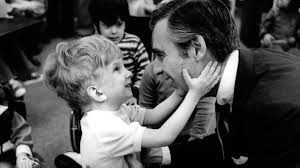 St. Francis famously advocated to: “Preach always, sometimes even with words.” Fred Rogers, through his actions, showed himself to be an avid disciple.
St. Francis famously advocated to: “Preach always, sometimes even with words.” Fred Rogers, through his actions, showed himself to be an avid disciple. 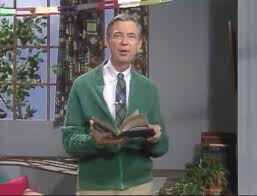 Though the subject of Fred Rogers’ specific spiritual beliefs came up sparingly in the documentary, aside from the fact of his ordination as a minister,
Though the subject of Fred Rogers’ specific spiritual beliefs came up sparingly in the documentary, aside from the fact of his ordination as a minister, 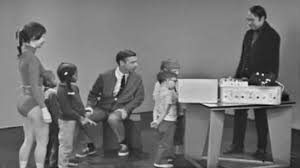 his adherence to the foundational Christian belief that all men are brothers, beloved of and equal in God’s eyes, comes out boldly and profoundly in everything Fred Rogers did, or said.
his adherence to the foundational Christian belief that all men are brothers, beloved of and equal in God’s eyes, comes out boldly and profoundly in everything Fred Rogers did, or said.
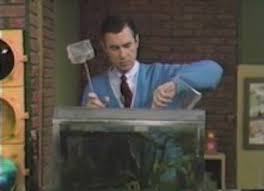 The documentary dips into the very deep well of video on which he appears.
The documentary dips into the very deep well of video on which he appears. 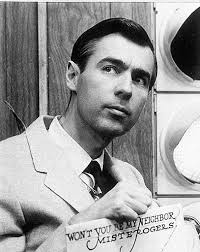 Not just the copies of almost 1,000 shows, but his
Not just the copies of almost 1,000 shows, but his  personal appearances on interview programs, at schools, and even before Congress! There is no lack of documentation of Fred Rogers’ progress from his early philosophical musings before a piano on teaching children about serious issues, probably filmed by his wife, in 1962, all the way through the blooper video clips from his very last show in 2001 and his PSA in 2002 on 9/11.
personal appearances on interview programs, at schools, and even before Congress! There is no lack of documentation of Fred Rogers’ progress from his early philosophical musings before a piano on teaching children about serious issues, probably filmed by his wife, in 1962, all the way through the blooper video clips from his very last show in 2001 and his PSA in 2002 on 9/11.
The documentary interviews his 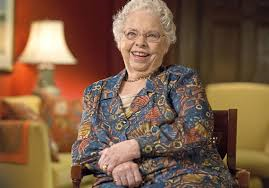 wife,
wife, 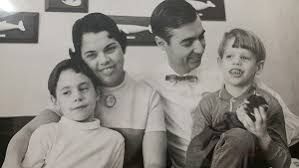 his sons,
his sons, 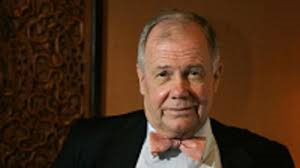 John and Jim, his co-workers, friends, associates, and other interviewers. They come from many walks of life, and life styles. But all people were equal in Fred Rogers’ eyes.
John and Jim, his co-workers, friends, associates, and other interviewers. They come from many walks of life, and life styles. But all people were equal in Fred Rogers’ eyes. 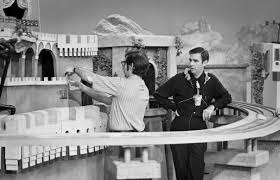 Rogers maintained a tight ship, monitoring every aspect of the show, and required understandably scrupulous behavior, watching over the reputation of the show with care and affection for everyone involved in the production. Mr. Rogers, for example, forbade one actor from frequenting a particular bar and
Rogers maintained a tight ship, monitoring every aspect of the show, and required understandably scrupulous behavior, watching over the reputation of the show with care and affection for everyone involved in the production. Mr. Rogers, for example, forbade one actor from frequenting a particular bar and 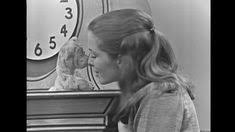 Betty Aberlin (Lady Aberlin) from appearing in Romero’s Night of the Living Dead.
Betty Aberlin (Lady Aberlin) from appearing in Romero’s Night of the Living Dead. However, Rogers’ fatherly supervision of his cast and crew did not discourage a certain level of good-natured juvenile behavior amongst those Mrs. Rogers remembered he called his “playmates”, such as practical jokes on set or a poster made from a tasteless but amusing photo clandestinely left on Rogers’ camera by a mischievous member of the crew.
However, Rogers’ fatherly supervision of his cast and crew did not discourage a certain level of good-natured juvenile behavior amongst those Mrs. Rogers remembered he called his “playmates”, such as practical jokes on set or a poster made from a tasteless but amusing photo clandestinely left on Rogers’ camera by a mischievous member of the crew.
SPOILERS
Back in the 1960's, there were topics, it was understood, that children’s programming just would not explore. Mr. Roger’s Neighborhood’s stock in trade was the places where angels would fear to tread. He tackled issues head on that many adults avoided: 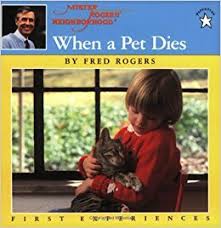 death, divorce, lost children,
death, divorce, lost children, 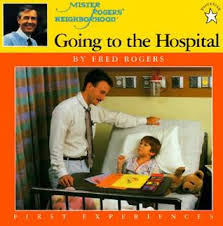 serious illness, and disabilities. He had guest stars, wrote books,
serious illness, and disabilities. He had guest stars, wrote books, 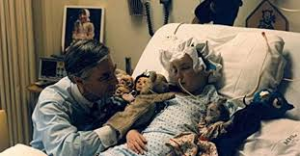 made appearances, did interviews, and performed puppet plays intended to translate these complex topics in ways which children could understand, talk about, and express their confusions and concerns.
made appearances, did interviews, and performed puppet plays intended to translate these complex topics in ways which children could understand, talk about, and express their confusions and concerns.
The cast and crew were close and the show was very personal to everyone involved. 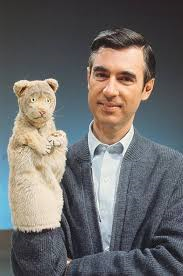 Daniel the Tiger, the avatar most close to Fred Roger's heart and personality, according to those who knew him best, often spoke of insecurity and self doubt.
Daniel the Tiger, the avatar most close to Fred Roger's heart and personality, according to those who knew him best, often spoke of insecurity and self doubt. 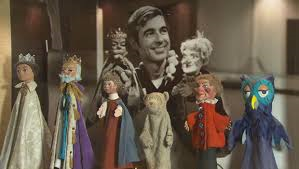 King Friday XIII and his Queen dealt frequently with parental concerns. Everyone on the cast was known by a real name. Lady Aberlin's name was Betty Aberlin, Officer Clemmons was, in real life, the powerhouse singer, Francois Scarborough Clemmons, and the name
King Friday XIII and his Queen dealt frequently with parental concerns. Everyone on the cast was known by a real name. Lady Aberlin's name was Betty Aberlin, Officer Clemmons was, in real life, the powerhouse singer, Francois Scarborough Clemmons, and the name 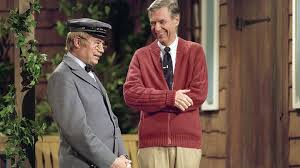 Mr. McFeely, though played by David Newell, was Fred Rogers' middle name.
Mr. McFeely, though played by David Newell, was Fred Rogers' middle name.
In the ‘60's, when black people were forced out of public pools,  Fred Rogers pointedly invited Francois Clemmons, a black man portraying Mr. Rogers’ local police officer, to come join him on a hot day as he soaked his feet in a child’s plastic pool and to share his towel. Fred Rogers went out of his way to rinse Officer Clemmons' feet with his hose and offer him his towel. There is no mistaking the reference to Jesus' washing of his disciples feet nor of the point Mr. Rogers made. I couldn’t help but laugh as Mr. Rogers looked up at the camera from contemplating their cooling feet. There was an expression I'd never seen on the face of this usually sweet, impeturbable man – just a glimpse of his righteousness anger at the injustices which inspired this demonstration, as though, for a moment, he was staring down anyone who would dare question his actions. I hoped those at the time, he was silently addressing, had seen and squirmed in shame.
Fred Rogers pointedly invited Francois Clemmons, a black man portraying Mr. Rogers’ local police officer, to come join him on a hot day as he soaked his feet in a child’s plastic pool and to share his towel. Fred Rogers went out of his way to rinse Officer Clemmons' feet with his hose and offer him his towel. There is no mistaking the reference to Jesus' washing of his disciples feet nor of the point Mr. Rogers made. I couldn’t help but laugh as Mr. Rogers looked up at the camera from contemplating their cooling feet. There was an expression I'd never seen on the face of this usually sweet, impeturbable man – just a glimpse of his righteousness anger at the injustices which inspired this demonstration, as though, for a moment, he was staring down anyone who would dare question his actions. I hoped those at the time, he was silently addressing, had seen and squirmed in shame. 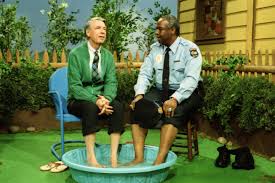 Mr. Roger and Mr. Clemmons re-enacted the event some years later.
Mr. Roger and Mr. Clemmons re-enacted the event some years later.
 When Bobby Kennedy was murdered, Fred Rogers’ show had Lady Aberlin and Daniel the Tiger discuss what the word “assassination” meant.
When Bobby Kennedy was murdered, Fred Rogers’ show had Lady Aberlin and Daniel the Tiger discuss what the word “assassination” meant.  When the Challenger blew up in front of millions of kids, Fred Rogers was there to confront the topic with his beloved puppets in ways small children could understand.
When the Challenger blew up in front of millions of kids, Fred Rogers was there to confront the topic with his beloved puppets in ways small children could understand. 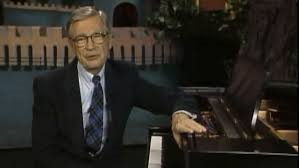 When the horrific attack on our country was made by Islamic terrorists on 9/11, Fred Rogers came out of retirement, ill with only months left before he would pass away, to offer comfort to 33 years of children who had grown up watching him.
When the horrific attack on our country was made by Islamic terrorists on 9/11, Fred Rogers came out of retirement, ill with only months left before he would pass away, to offer comfort to 33 years of children who had grown up watching him.
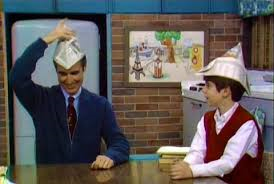 Mr. Rogers was the personification of kindness and the exemplification of Jesus’ instruction to his apostles as he sent them to preach, to be: “…wise as serpents and harmless as doves.”
Mr. Rogers was the personification of kindness and the exemplification of Jesus’ instruction to his apostles as he sent them to preach, to be: “…wise as serpents and harmless as doves.” 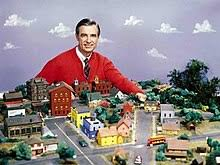 Rogers loved and put at ease everyone he met, but was uncompromising in his beliefs and could talk anybody into anything he believed was right.
Rogers loved and put at ease everyone he met, but was uncompromising in his beliefs and could talk anybody into anything he believed was right.
Rogers’ powers of persuasion were legendary. 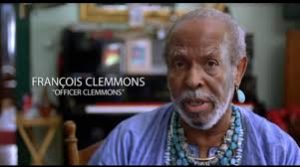 Mr. Clemmons, during the documentary, explained that just portraying a police officer as a black man at the time was initially out of his comfort zone, because he had grown up afraid of police. But Clemmons put on the uniform and gave good example, portraying this character for decades.
Mr. Clemmons, during the documentary, explained that just portraying a police officer as a black man at the time was initially out of his comfort zone, because he had grown up afraid of police. But Clemmons put on the uniform and gave good example, portraying this character for decades. 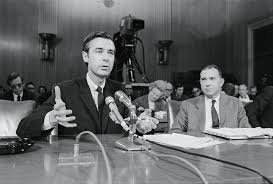 Mr. Rogers could reason anyone into doing the right thing, including convincing an extremely prejudiced and skeptical
Mr. Rogers could reason anyone into doing the right thing, including convincing an extremely prejudiced and skeptical 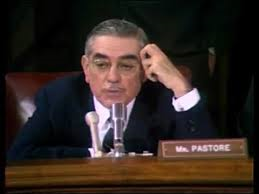 Congressman Pastore out of the 20 MILLION dollars needed in 1969 to keep a fledgling Public Broadcast System afloat, by simply being reasonable. See the Youtube of Rogers' appearance before the subcommittee here.
Congressman Pastore out of the 20 MILLION dollars needed in 1969 to keep a fledgling Public Broadcast System afloat, by simply being reasonable. See the Youtube of Rogers' appearance before the subcommittee here.
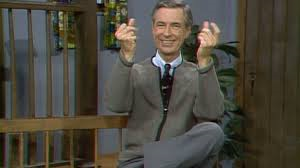 Mr. Rogers recognized what a force for good the power of the television medium could be and how its worth was being wasted on frivolous, violent and brainless assaults on children’s senses.
Mr. Rogers recognized what a force for good the power of the television medium could be and how its worth was being wasted on frivolous, violent and brainless assaults on children’s senses. 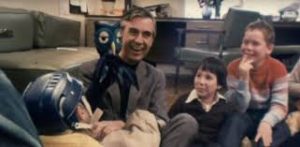 His mind set was to minister to children of all ages by taking their feelings and thoughts seriously, and help them cope with the normal struggles of life.
His mind set was to minister to children of all ages by taking their feelings and thoughts seriously, and help them cope with the normal struggles of life.  He featured everyone from the profoundly physically challenged Jeffrey Erlanger to
He featured everyone from the profoundly physically challenged Jeffrey Erlanger to 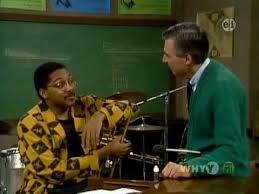 a young Wynton Marsalis to
a young Wynton Marsalis to 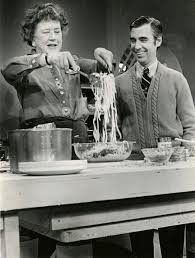 the famous Julia Child to
the famous Julia Child to 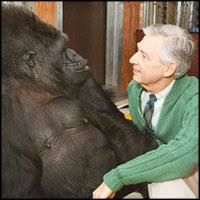 Koko the Gorilla.
Koko the Gorilla. 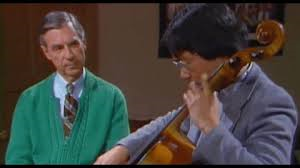 Yo Yo Ma, the famous cellist, not only appeared several times on the show,
Yo Yo Ma, the famous cellist, not only appeared several times on the show,  but was a friend, was interviewed for the documentary, and is credited by the director, Morgan Neville, as being the inspiration for the documentary. While interviewing Mr. Ma for a different project, Mr. Neville asked Mr. Ma how he dealt with fame. Ma's response surprised him – that he learned it from Mr. Rogers who, it turned out, assured Mr. Ma that fame was not an inherently bad thing, and mentored him on the appropriate ways to use this gift.
but was a friend, was interviewed for the documentary, and is credited by the director, Morgan Neville, as being the inspiration for the documentary. While interviewing Mr. Ma for a different project, Mr. Neville asked Mr. Ma how he dealt with fame. Ma's response surprised him – that he learned it from Mr. Rogers who, it turned out, assured Mr. Ma that fame was not an inherently bad thing, and mentored him on the appropriate ways to use this gift.
Like Colonel Pickering, who  treated even a flower girl like Elisa Doolittle as though she were a lady,
treated even a flower girl like Elisa Doolittle as though she were a lady,  Mr. Rogers treated everyone alike, to be valued as a child of God. His love for every man was carried out in his prison ministry, and his outreach to adults, Old Friends, New Friends which aired during the hiatus of his Neighborhood during 1967-8.
Mr. Rogers treated everyone alike, to be valued as a child of God. His love for every man was carried out in his prison ministry, and his outreach to adults, Old Friends, New Friends which aired during the hiatus of his Neighborhood during 1967-8.
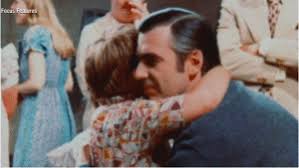 He was a missionary of fraternal love to mankind and The Good Samaritan to the world.
He was a missionary of fraternal love to mankind and The Good Samaritan to the world. 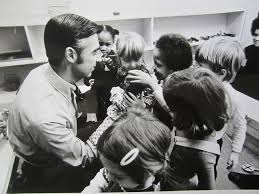 I am so glad his ministry lives on in his shows, in the memories of his friends, family, co-workers and those children, now adults, who watched him and were positively influenced.
I am so glad his ministry lives on in his shows, in the memories of his friends, family, co-workers and those children, now adults, who watched him and were positively influenced. 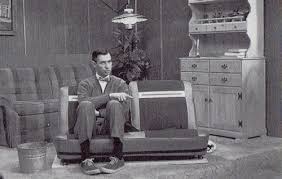 The picture of humility, his wife remembered how on his death bed he wondered if he would be accepted into Jesus' sheepfold.
The picture of humility, his wife remembered how on his death bed he wondered if he would be accepted into Jesus' sheepfold. 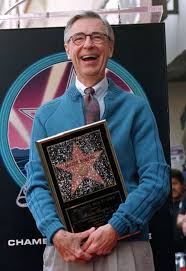 Known world wide,
Known world wide, 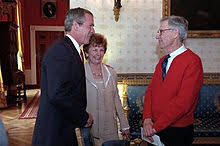 recognized and admired by celebrities, all he thought of himself was God's unworthy servant.
recognized and admired by celebrities, all he thought of himself was God's unworthy servant.
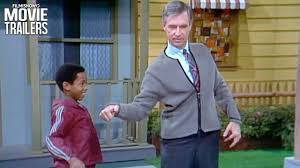 In this, the 50th anniversary year of his show’s debut, not only will a commemorative U.S. postage stamp featuring Fred Rogers be released, but
In this, the 50th anniversary year of his show’s debut, not only will a commemorative U.S. postage stamp featuring Fred Rogers be released, but 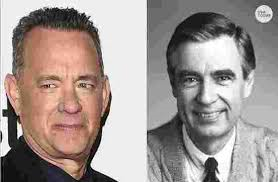 work has begun on a biopic of the legendary minister, starring Tom Hanks, planned for release in 2019.
work has begun on a biopic of the legendary minister, starring Tom Hanks, planned for release in 2019.
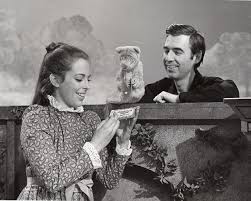 Jesus said the second half of the greatest law is to: “Love your neighbor as yourself.”
Jesus said the second half of the greatest law is to: “Love your neighbor as yourself.” 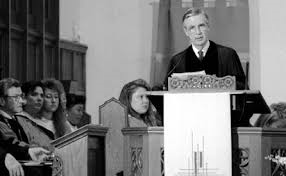 Rogers was an ordained minister, so it was obviously not a coincidence that in the world of his “Neighborhood,”
Rogers was an ordained minister, so it was obviously not a coincidence that in the world of his “Neighborhood,”  Fred Rogers' declared, by word and action, daily, that he liked his fellow man, with a Christian love, just the way they were. St. Francis should be proud.
Fred Rogers' declared, by word and action, daily, that he liked his fellow man, with a Christian love, just the way they were. St. Francis should be proud.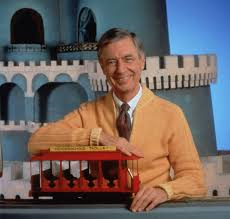



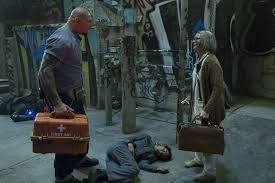

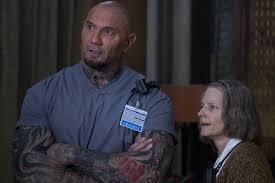

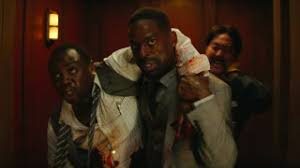
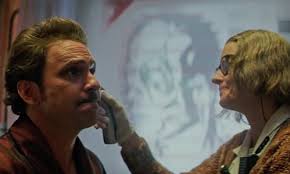
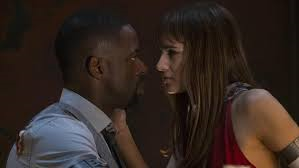
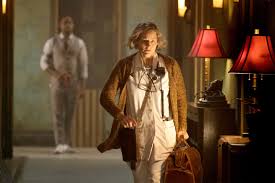



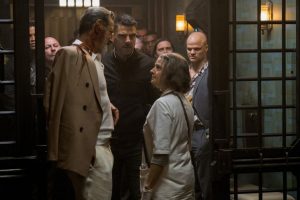 And, Hallelujah, Hotel Artemis does not always take itself completely seriously. Goldblum's character is aware that he is a very bad guy and likely to come to a very bad end. Baustista's character knows he is massive and almost unstoppable but has a gentle and fiercely protective spot for this tiny fragile elderly and essentially kind maternal Nurse.
And, Hallelujah, Hotel Artemis does not always take itself completely seriously. Goldblum's character is aware that he is a very bad guy and likely to come to a very bad end. Baustista's character knows he is massive and almost unstoppable but has a gentle and fiercely protective spot for this tiny fragile elderly and essentially kind maternal Nurse. 